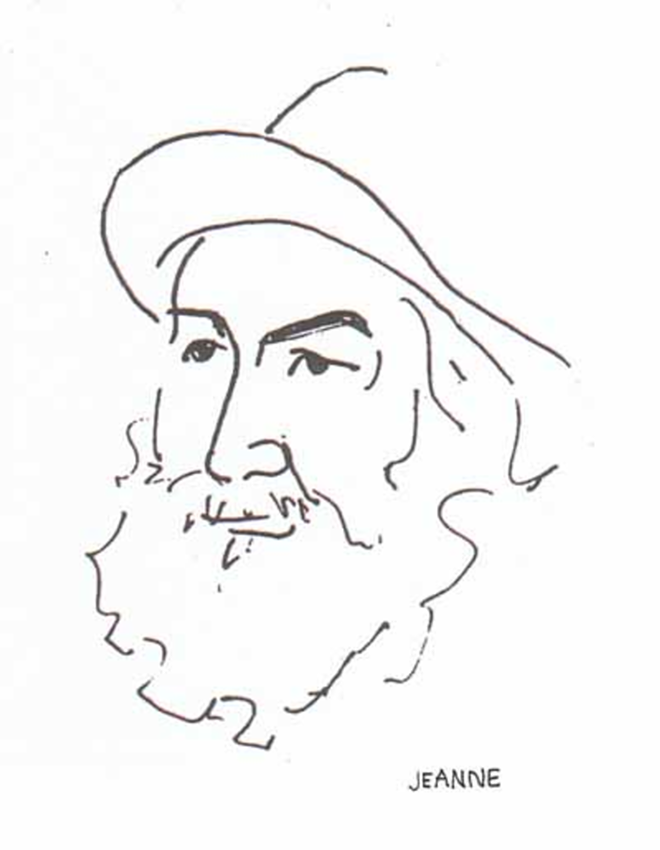
A noiseless patient spider...
Launch'd forth filament, filament, filament, out of itself,
Ever unreeling them, ever tirelessly speeding them.
Walt Whitman (1819-1892) said that the subject of his poetry was "the United States themselves," and although he was fired from a job at the Department of the Interior because he published the "scandalous" Leaves of Grass, he, along with Emily Dickinson (1830-1886), was the co-founder of American poetry. Whitman was gay, Dickinson a recluse, and if you throw in the opium-addicted Edgar Allan Poe (1809-1849), you can see why the idea developed in certain circles that American poetry was hatched by unreliable outsiders. "Don't ask, don't tell" doesn't seem to work well for poets, either.
Whitman, the most democratic of poets, saw the top connected to the bottom; he knew that the wounded soldiers he nursed in Washington were connected to the price of beef in Philadelphia. In a few lines, Dickinson could link heaven, death, music, light, weight and other entities (There's a certain Slant of light / Winter Afternoons— / that oppresses, like the Heft / Of Cathedral Tunes...). And Poe's dark visions could join thrones to graves, beauty to death, and science to vultures. Poetry sees connections: "Hope is the thing with feathers," "Shall I compare thee to a summer's day?"
Science is also convinced that everything's related. The grail of scientists today is String Theory, or any formula that will apply to Everything. Earlier, we had the Butterfly Theory put forth by Edward Lorenz (1917-2008), holding that the fluttering of a butterfly's wings in China can result in a tornado in Texas — asserting the hard-to-see but essential connectiveness in a chaotic universe, despite its infinite complications. Folklore long ago expressed this in a military analogy: For want of a nail, the shoe was lost; For want of a shoe the horse was lost... right up to the loss of the battle and the kingdom.
Philosophy and economics make connections, too. (Only religion seems to separate: this one burns in hell; this one gets the virgins.) A favorite Republican theory is that money scarfed up by millionaires will trickle down to the lucky poor — so don't worry, the system will eventually benefit everyone. Let's admit it does benefit a lot of people, but alas, unlike the Butterfly Theory, this one doesn't hold up under scrutiny, scientific or otherwise: the gap between the rich and the poor has been gaping wider for decades, and picking up speed.
Just as the butterfly isn't the cause of the tornado, only a part of the initial system, so the huge salaries on Wall Street (and elsewhere) aren't the cause but a major ingredient in an arrangement that results in Americans being ranked behind most civilized countries in health and life expectancy (a kind of Bitterfly Theory). Of course, most Americans, like most Canadians, Europeans and Scandinavians, are doing all right — but we're losing ground, despite the enormous sums of money we spend on health care. Common sense and statistics show that the poor and, increasingly, the middle class, take it on the nose, and elsewhere. When we see Wall Street restarting the system that tanked the economy, a national anger is fueled — but so far, the anger's been misdirected. Many people don't seem to grasp that this warped distribution of wealth leaves 46 million uninsured, plus all but the very rich susceptible to a single catastrophe that can wipe out a lifetime's endeavors.
The French live longer than we do not because they drink more red wine (though the wine helps), but because their lives are basically calmer: unlike most Americans, they're not one illness or injury away from losing everything.
On the afternoon I talked to the "15th Street Scribes" — an inspiring group of homeless writers in St. Petersburg who meet in a small windowless room at St. Vincent de Paul — the morning paper reported how easily and quickly Governor Crist had raised $4.3 million for his Senate campaign. I remembered Robert Penn Warren's political masterpiece, All the King's Men (1948), where his basic theme, like Whitman's, is that all people and events are in some way connected "like an enormous spider web... and the vibration ripples to the remotest perimeter." In this metaphor, the financial plunderers are gaming the web. They do nothing useful — they just eat the butterflies — so the millions they make don't trickle down. At the same time, the crowd of homeless people, innocent and guilty together, mumbling and shuffling under the I-275 underpass waiting for the soup kitchen to open, feel a small tremor at the bottom of the web — a toothache maybe, or a stitch in the stomach, and look nervously around...
And you O my soul where you stand...
Ceaselessly musing, venturing, throwing, seeking the spheres
to connect them,
Till the gossamer thread you fling catch somewhere, O my soul.
—Peter Meinke (www.petermeinke.com) claims to have butterflies in his wallet, but Jeanne says he never can remember where it is anyway. Their latest collaboration is Lines from Neuchâtel, University of Tampa Press. The quotes beginning and ending this article are from Whitman's "A Noiseless Patient Spider."

